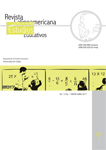Authors
Abstract
The present article is part of the results of the research project “Semiosis of pedagogy, curriculum and didactics,” which was developed with a mixed design - quantitative and quantitative, and whose guiding questions were: What is the current scope of the curriculum?; What is the meaning and sense of curricular knowledge? Given the magnitude of the study, only curriculum conceptions, their dominant ideas, and the rationales that support them are dealt with in a partial way, to finish with the meaning and sense given to the curriculum by students and professors of seven undergraduate bachelor’s programs at Universidad de Caldas in the city of Manizales.
References
Bernstein, B. (1985). Clasificación y enmarcación del conocimiento educativo. Madrid, España: Akal.
Bobbitt, F. (1918). The Curriculum. Boston, USA: Houghton Mifflin.
Bruner, J.S. (1960). The Process of Education. Massachusetts, USA: Harvard University Press.
Contreras, J. (1994). El currículo como formación. En Angulo, F. y Blanco N. (Coord.), Teoría y desarrollo del currículo. Archidona, España: Aljibe.
Coll, C. et al. (1995). El constructivismo en el aula. Barcelona, España: Editorial Grao.
De Alba, A. (1991). Evaluación curricular. Conformación conceptual del campo. Ciudad de México, México: Universidad Nacional Autónoma de México.
Da Silva, T.T. (1999). Espacios de identidad. De las teorías tradicionales a las teorías críticas. Belo Horizonte, Brasil: Auténtica Editorial.
Díaz Barriga, Á. (1997). Didáctica y curriculum. Barcelona, España: Paidós.
Díaz Barriga, Á. (2003). Currículum. Tensiones conceptuales y prácticas. Revista Electrónica de Investigación Educativa, 5 (2). Recuperado de http://redie.uabc.mx/contenido/vol5no2/contenido-diazbarriga.pdf.
Dewey, J. (2008). Democracy and Education. New York, USA: Macmillan.
Doll, W. (1993). A post-Modern Perspective on Curriculum. New York, USA: Teachers College Press.
Elliott, J. (1990). La investigación-acción en educación. Madrid, España: Morata.
Escudero, J. et al. (1999). Diseño, desarrollo e innovación del currículo. Madrid, España: Morata.
Ferry, G. (1991). El trayecto de la formación: los enseñantes entre la teoría y la práctica. Barcelona, España: Paidós.
Gimeno, S. (1986). La pedagogía por objetivos: obsesión por la eficiencia. Madrid, España: Morata.
Gimeno, S. (1989). La enseñanza: su teoría y su práctica. Madrid, España: Akal.
Gimeno, S. (1995). Obsesión por la eficiencia. Madrid, España: Morata.
Gimeno, S. (1995). El curriculum: una reflexión sobre la práctica. Madrid, España: Morata.
Giroux, H. (1983). Theory and Resistance in Education: Towards a Pedagogy for the Opposition. Connecticut, USA: Praeger Publishers.
Gvirtz, S. y Palamidessi, M. (1995). El ABC de la tarea docente: curriculum y enseñanza. Buenos Aires, Argentina: Editorial AIQUE.
Grundy, S. (1998). Producto o praxis del curriculum. Madrid, España: Morata.
Hernández, R. et al. (2014). Metodología de la investigación. Ciudad de México, México: McGraw-Hill. Sexta Edición
Habermas, J. (1982). Conocimiento e interés. Madrid, España: Taurus.
Hueber, H. (1983). El estado moribundo del curriculum. En Gimeno, S. y Pérez, Á. (Comp.), La enseñanza, su teoría y su práctica (pp. 210-222). Madrid, España: Akal.
Kemmis, S. (1993). El curriculum, más allá de la teoría de la reproducción. Madrid, España: Morata.
Kohlberg, L. (1981). The Philosophy of Moral Development. Moral Stages and the Idea of Justice. San Francisco, USA: Harper & Row Pubs.
Koselleck, R. (2000). Los estratos del tiempo: estudios sobre la historia. Barcelona, España: Paidós.
Morelli, S. (2005). Currículum, técnica y escolarización. Aliados de una travesía educativa. La Trama de la Comunicación, 10, 19.
Parra, G. y Pasillas, M. (1991). Lo sustancial y lo accesorio en el currículo. Revista Argentina de Educación, IX (16).
Peñaloza Ramella, W. (2005). El currículo integral. Recuperado de http://www.unmsm.edu.pe/educacion/postgrado/curriculo.pdf.
Phenix, H. (1964). Realms of Meaning; A Philosophy of the Curriculum for General Education. New York, USA: McGraw-Hill.
Pinar, W. (1976). Toward a Poor Curriculum. New York, USA: Palgrave Macmillan.
Pinar, W. (1999). Curriculum: Toward New Identities. Louisiana, USA: Louisiana State University.
Popkewitz, T. (1988). Paradigma e ideología en investigación educativa. Las funciones sociales del intelectual. Madrid: Mondadori.
Posner, G. (2004). Análisis del currículo. Bogotá, Colombia: MacGraw-Hill.
Reid, I. (1994). The reform: Change or transformation of initial teacher training? En Reid, I., Constable, H. and Griffiths, R. (Ed.), Teacher Education Reform (pp. 3-11). London, England: Paul Chapman Publishing Ltd.
Schwab, J. (1983). Un enfoque práctico como lenguaje para el curriculum. En Gimeno, S. y Pérez, Á. (Comp.), La enseñanza, su teoría y su práctica (pp. 197-208). Madrid, España: Akal.
Stenhouse, L. (1987). La investigación como base de la enseñanza. Madrid, España: Morata.
Stenhouse, L. (1998). Investigación y desarrollo del curriculum. Madrid, España: Morata.
Taba, H. (1974). Elaboración del curriculum: teoría y práctica. Buenos Aires, Argentina: Editorial Troquel.
Tyler, R.W. (1986). Principios básicos del currículo. Buenos Aires, Argentina: Editorial Troquel.

 PDF (Español)
PDF (Español)
 FLIP
FLIP























